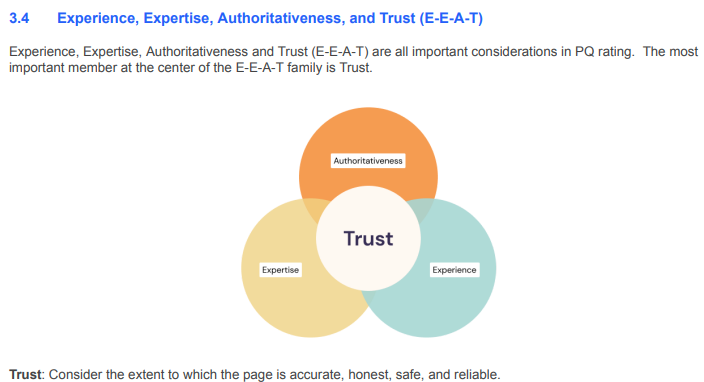E-E-A-T指的是Experience,Expertise, Authoritativeness, and Trustworthiness.

1.For example, if an author is writing an iPhone review, they should have used the product – or if they are writing about the best restaurants in San Francisco, they should have visited them.
Google’s updated Search Quality Rater Guidelines say this about experience:
“Consider the extent to which the content creator has the necessary first-hand or life experience for the topic. Many types of pages are trustworthy and achieve their purpose well when created by people with a wealth of experience.
For example, which would you trust: a product review from someone who has personally used the product or a “review” by someone who has not?”
2.如休做到E-E-A-T
Experience: Show that your content is created by people with direct, first-hand experience with the topic. This could be through author bios, “behind the scenes” content, or by directly referencing personal experiences within the content itself.
Expertise: Demonstrate your subject matter expertise through the depth and accuracy of your content and author credentials and by citing reputable sources and studies.
Authoritativeness: Build your brand’s authority by consistently publishing high-quality content, earning coverage and mentions from other respected sites, and growing your reputation within your industry.
Trustworthiness: Be transparent about who is behind your content, provide clear contact and customer service information, maintain a positive reputation, and follow ethical content practices.
3.Chapter 5.1: Lacking E-E-A-T
Chapter 5.1 of Google’s Search Quality Rater Guidelines has examples of what quality raters are instructed to look for when evaluating a low level of E-E-A-T:
“Low quality pages often lack an appropriate level of E-E-A-T for the topic or purpose of the page. Here are some examples:
The content creator lacks adequate experience, e.g. a restaurant review written by someone who has never eaten at the restaurant.
The content creator lacks adequate expertise, e.g. an article about how to skydive written by someone with no expertise in the subject.
The website or content creator is not an authoritative or trustworthy source for the topic of the page, e.g. tax form downloads provided on a cooking website.
The page or website is not trustworthy for its purpose, e.g. a shopping page with minimal customer service information.”
4.E-E-A-T And AI Generated Content
Google has advised against publishing AI-generated content without human review and editing. The company clarified that using AI isn’t inherently against guidelines, but the content must be evaluated for accuracy, usefulness, and compliance with other quality guidelines.
Marie Haynes, a respected expert on E-E-A-T and search quality, has been closely following the impact of AI on search. She notes that Google seems increasingly focused on rewarding original, high-quality content while devaluing generic or low-quality AI-generated content.
This aligns with recent developments like Google’s March 2024 Core Update, which resulted in the deindexing of hundreds of websites, many of which were found to contain significant amounts of AI-generated content.
This update and Google’s guidance on evaluating AI content for “originality” suggest that the search engine is actively combating the rise of low-quality, generic AI content that doesn’t meet E-E-A-T standards.
For brands and content creators, the key is to use AI to assist and enhance human-created content, not replace it entirely.
AI can help with research, outlining, and even drafting, but the final content should always be reviewed, edited, and enhanced by a human expert with real-world experience. This approach allows for the efficiency benefits of AI while still maintaining the E-E-A-T qualities Google values.
https://www.searchenginejournal.com/google-e-e-a-t-how-to-demonstrate-first-hand-experience/474446/
二、那么我们做网站的时候,应该如何做呢?
在google搜索"how to lose weight fast",研究排在首页的网页,你会发现:
1.文章并不是一定要1000,2000字,有些几百字的文章也能排第一页(当然网站权重比较高)。
2.还是大标题套小标题的比较多,而且每个小标题并不需要太多文字。
https://www.healthline.com/nutrition/how-to-lose-20-pounds#reduce-carbs
2.文章中链接到权威的网站,比如在Research,One study这些文字上链接到外部的网站。
https://www.medicalnewstoday.com/articles/322345#tracking-diet-and-exercise
三、个人站长的未来之路在哪里?
1.电商网站。
2.与线下合作的地方站
3.youtube
行业的方向啊,这个你真的没有想过。
https://www.youtube.com/watch?v=YNMIfgo65MQ

